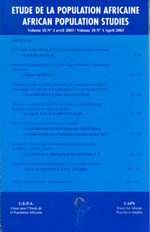
|
African Population Studies
Union for African Population Studies
ISSN: 0850-5780
Vol. 27, No. 2, 2013, pp. 140-154
|
 Bioline Code: ep13013
Bioline Code: ep13013
Full paper language: English
Document type: Research Article
Document available free of charge
|
|
|
African Population Studies, Vol. 27, No. 2, 2013, pp. 140-154
| en |
Trend and correlates of contraceptive use in rural and urban Ethiopia: is there a link to the health extension programme?
Gurmu, Eshetu & Mturi, Akim J.
Abstract
When international funders shifted funding priorities from family planning to HIV/AIDS in the mid-1990s, most family planning programmes in Africa faced serious challenges. The government of Ethiopia took a creative route of establishing the Health Extension Programme (HEP) in 2004 that provides health care services including family planning and integrated population issues into the school curricula besides promulgating contraceptive use as a right for all women of reproductive age. This study aims at analysing the correlates of contraceptive use in rural and urban Ethiopia using the Demographic and Health Survey data of 2000, 2005 and 2011. Data were analysed using tabular and graphical methods, and a binary logistic regression model was fitted to identify factors associated with contraceptive use. Findings of the study reveal that contraceptive uptake, particularly injectable, has increased markedly in the rural areas as a result of the implementation of the HEP despite regional variations in the level of commitment to the family planning package. Other African countries need to emulate such an initiative but ensuring equal commitment throughout the nation to overcome any possible outrages.
Keywords
Contraceptive use; health extension programme; family planning; rural women; Ethiopia; sub-Saharan Africa
|
| |
© African Population Studies
Alternative site location: http://www.uaps-uepa.org
|
|
